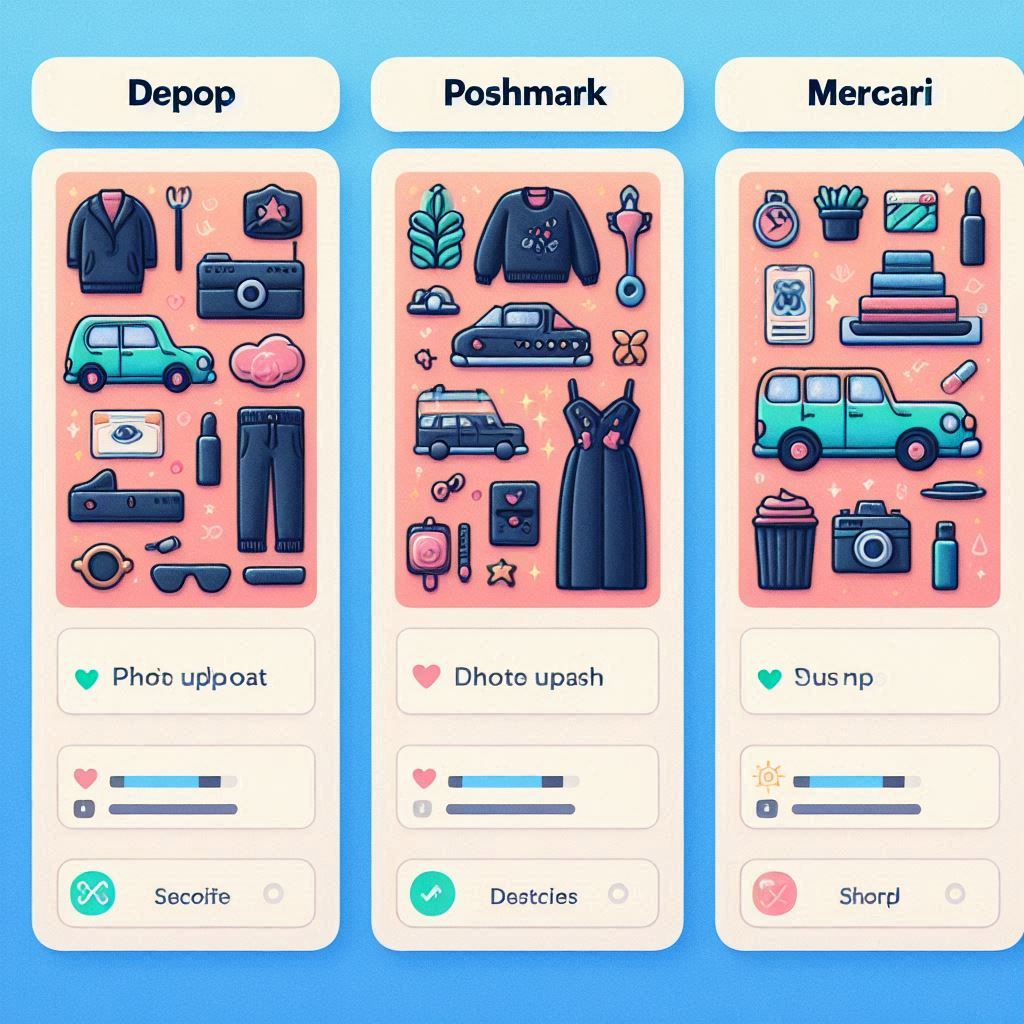Ready to turn your pre-loved clothes into profit? The resale market is booming, with more and more people embracing sustainable fashion and seeking unique finds at great prices. But with so many online platforms vying for your attention, choosing the right one can feel overwhelming.
That’s where this ultimate comparison guide comes in. We’re diving deep into the three leading contenders for social reselling: Depop, Poshmark, and Mercari. By the end, you’ll have a clear understanding of each platform’s strengths, weaknesses, and which one aligns best with your reselling style and goals.
Table of Contents
- I. Introduction
- II. Platform Overview: At a Glance
- III. Deep Dive: Comparing Key Features
- IV. Reseller Strategies for Success on Each Platform
- V. Case Studies: Real Reseller Experiences
- VI. FAQ: Addressing Common Questions
- VII. Conclusion
I. Introduction
Gone are the days of dusty thrift stores being the only haven for pre-loved fashion. The rise of social reselling has revolutionized how we buy and sell clothing, transforming online marketplaces into vibrant communities. Leading the charge are Depop, Poshmark, and Mercari, each with its unique flavor and appeal.
Depop has captured the hearts (and wallets) of Gen-Z, becoming synonymous with vintage, streetwear, and one-of-a-kind pieces. Poshmark boasts a strong following among Millennials and Gen-Z, offering a broad range of fashion with a particularly active community around women’s apparel. Mercari stands out as a more general marketplace, attracting a wider age range with a penchant for everyday items and budget-friendly discoveries.
This guide will equip you with the knowledge to navigate these platforms effectively, maximizing your reselling potential and finding the perfect fit for your business.
II. Platform Overview: At a Glance
Let’s start with a high-level view of each platform, comparing their key features side-by-side:
| Feature | Depop | Poshmark | Mercari |
| Founded | 2011 | 2011 | 2013 |
| Target Audience | Gen-Z, fashion-forward individuals | Millennials, Gen-Z, fashion enthusiasts | Wider age range, value-conscious shoppers |
| Focus | Vintage, streetwear, unique fashion | Broad fashion range, strong in women’s apparel | General marketplace, variety of items |
| Listing Fees | None | None | None |
| Transaction Fees | 10% + PayPal fees (2.9% + $0.30) | $2.95 (under $15) or 20% | 10% + payment processing fees |
| Shipping Options | Seller choice, free or buyer-paid | Prepaid labels, flat-rate shipping | Flexible, prepaid labels, local delivery |
| Social Features | Direct Messaging (DMs), following, liking | Posh Parties, liking, sharing | Chat for item inquiries |
| Unique Selling Points | Gen-Z focus, shop customization, aesthetic-driven | Active community, “Posh Parties” | Speed, AI-assisted listings, diverse inventory |

III. Deep Dive: Comparing Key Features
Now, let’s delve into a more detailed analysis of each platform, dissecting the features that matter most to resellers.
Understanding a platform’s dominant demographic is crucial for success. You need to ensure your inventory aligns with what buyers are actively seeking.
- Depop: Depop is the reigning champion for Gen-Z shoppers. Think vintage band tees, reworked streetwear, Y2K aesthetics, handmade jewelry, and anything that screams individuality. If your style leans towards trendy, unique, and expressive, Depop is your playground.
- Poshmark: While Poshmark appeals to both Millennials and Gen-Z, it has a strong presence in the world of women’s apparel. You’ll find everything from designer handbags to everyday basics. While other categories exist, you’ll have the most competition (and potential buyers) in the fashion realm.
- Mercari: Mercari casts a wider net, attracting a more general audience that appreciates a good deal. You’ll find a diverse mix of items, from home goods and electronics to toys and, yes, clothing. Mercari shines for its value-driven shoppers seeking discounts and practical finds.
Reseller Takeaway: Do your market research! Before committing to a platform, browse its listings and explore popular styles. Make sure your inventory aligns with the platform’s core audience to maximize your chances of making sales.

B. Listing and Selling Experience
Each platform offers a slightly different listing experience, catering to varying levels of seller tech-savviness and time commitment.
- Depop: Depop puts a premium on visuals. Creating a cohesive and aesthetically pleasing shop is crucial. Listings require high-quality photos, and you can customize your shop with banners, profile pictures, and item arrangements to create a distinct brand identity. Depop provides less detailed description fields compared to other platforms.
- Poshmark: Poshmark streamlines the listing process with easy-to-use features. You can add multiple photos, detailed descriptions, and take advantage of “bulk listing” tools to upload multiple items simultaneously. Poshmark’s interface is intuitive and user-friendly, even for those new to reselling.
- Mercari: Mercari prioritizes speed and efficiency. The platform incorporates AI-powered features that can suggest titles, descriptions, and even pricing based on similar items. This makes listing quick and easy, especially for higher-volume sellers.
Reseller Takeaway:
- If you enjoy crafting a unique brand experience and excel at visual storytelling, Depop might be your ideal match.
- If you prefer a straightforward listing process and appreciate bulk listing features, Poshmark could be a better fit.
- If you’re looking for a platform that streamlines listings with AI assistance, Mercari might be your winning ticket.

The fees associated with each platform can significantly impact your profitability. It’s essential to understand the breakdown before setting your prices.
- Depop: Depop charges a 10% fee on the final sale price of your item. Additionally, PayPal charges a transaction fee (2.9% + $0.30) for processing payments.
- Poshmark: Poshmark takes a flat fee of $2.95 for sales under $15. For sales above $15, they charge a 20% commission. It’s important to note that Poshmark offers potential tax discounts for sellers, which can reduce your overall costs.
- Mercari: Mercari keeps it simple with a 10% fee on all sales, along with standard payment processing fees.
Reseller Takeaway: When calculating your prices, don’t forget to factor in the platform fees and payment processing costs to ensure you’re making a profit. Pay close attention to Depop’s combined Depop + PayPal fees, which can eat into your earnings.
Shipping can be a deal-breaker for online buyers. Understanding each platform’s shipping options and costs will help you attract more customers and minimize potential issues.
- Depop: Depop gives sellers the most control over shipping, allowing you to choose between free shipping or having the buyer pay. However, this flexibility requires careful calculation to ensure you cover your costs, especially for international sales.
- Poshmark: Poshmark simplifies shipping with a prepaid label system. They offer flat-rate shipping for items under 5 lbs, but the options are limited. This makes shipping straightforward for sellers but can be more expensive for buyers (especially for smaller or lighter items).
- Mercari: Mercari offers the most flexibility and emphasizes speed. You can choose from various shipping carriers and rates, including prepaid labels. They also offer a local delivery service for bulky or fragile items, further streamlining the shipping process.
Reseller Takeaway: Free or discounted shipping is a powerful incentive for buyers. If you can strategically incorporate these options into your pricing, you’ll increase your chances of making sales. Depop’s flexibility requires extra attention to shipping costs, so utilize a shipping cost calculator to ensure accurate pricing.

In the world of social reselling, building a community can be just as important as listing great items.
- Depop: Depop is a social butterfly. It heavily emphasizes community engagement, with direct messaging (DMs) allowing sellers and buyers to interact directly. Building a following, liking other users’ items, and actively participating in the Depop community is essential for success.
- Poshmark: Poshmark encourages community through its unique “Posh Parties,” virtual events where sellers can showcase their items to a larger audience. Liking and sharing features also help to build a network and increase visibility.
- Mercari: Mercari takes a more transaction-focused approach. While it offers a chat feature for item inquiries, it lacks the community-building emphasis of Depop and Poshmark.
Reseller Takeaway:
- Depop success requires consistent engagement, actively building a following and interacting with potential buyers.
- Poshmark sellers benefit from utilizing “Posh Parties” to showcase their items and participating in the social aspects of the platform.
- Mercari allows for a more streamlined approach, focusing on efficient listings and competitive pricing rather than building a large social network.

IV. Reseller Strategies for Success on Each Platform
Now that we’ve dissected the core features, let’s translate this knowledge into actionable strategies for maximizing your success on each platform.
Depop:
- Aesthetic is Everything: Depop is a visually driven platform. Cultivate a strong brand aesthetic that reflects your style and the trends popular with Gen-Z. Cohesive photos, creative styling, and a consistent color palette will make your shop stand out.
- Engage, Engage, Engage: Depop thrives on interaction. Respond to DMs promptly, comment on other users’ listings, and actively like items that align with your shop’s aesthetic. Building relationships with followers and the community is key.
- Ride the Trend Wave: Depop is all about being on-trend. Research popular styles and search terms (Y2K, cottagecore, dark academia), and source inventory that aligns with what’s hot.
- Photography Masterclass: High-quality, well-lit photos are non-negotiable on Depop. Experiment with flat lays, styled shots, and model photos to create visually appealing listings that stop scrollers in their tracks.
Poshmark:
- Party Power: Poshmark’s “Posh Parties” are your ticket to increased visibility. Participate actively, share your items in relevant parties, and utilize the platform’s scheduling features to maximize your reach.
- Bundle Up: Poshmark shoppers love a good deal. Create bundle listings for multiple items, offer discounts for bundles, and utilize Poshmark’s offer features to negotiate with buyers.
- Customer Service Superstar: Responsiveness and excellent customer service are essential on Poshmark. Answer questions quickly, address any concerns promptly, and go the extra mile to provide a positive buying experience.
Mercari:
- Price to Sell: Mercari’s diverse audience is highly value-driven. Competitive pricing is key to attracting buyers. Research comparable items and set prices that are appealing while ensuring your profit margins.
- Embrace AI: Mercari’s AI tools can save you significant time on listing creation. Utilize these features to generate titles, descriptions, and pricing suggestions. This frees up time for sourcing and focusing on other aspects of your business.
- Shipping Speed Demon: Mercari emphasizes speed. Offer fast shipping options, take advantage of prepaid labels, and explore Mercari Local for a convenient alternative to traditional shipping.

V. Case Studies: Real Reseller Experiences
Hearing from successful resellers can provide valuable insights and inspiration. Let’s take a look at some real-life examples from the audio and HTML:
- Lyuu (Depop): This 23-year-old turned her side hustle into a full-time career by selling vintage designer items and custom creations. Her niche focus and high-quality, stylized photos attract a loyal following.
- Allison Yeo (Depop): Allison supplements their income by selling curated cottagecore and academia-style clothing found at thrift stores. Their consistent listing updates and focus on natural fibers contribute to their success.
- Mary Milk (Depop): Mary has been a full-time Depop seller for four years, highlighting the importance of a “unique edge” to differentiate your shop and establish a loyal customer base.

These are just a few examples of the diverse paths to success on reselling platforms. By understanding the nuances of each platform and developing targeted strategies, you can achieve your own reselling goals.
VI. FAQ: Addressing Common Questions
As you embark on your reselling journey, you’re bound to encounter some common questions. Let’s address some of the most frequent concerns:
Q: What if my item doesn’t sell?
A: It’s common for items to sit a little longer than expected. Here are some tips to boost visibility and attract buyers:
- Refresh Your Listings: Regularly update your listings by making small edits to the price, description, or hashtags. This bumps your item to the top of search results, increasing its chances of being seen.
- Adjust Pricing: If an item isn’t getting any bites, consider lowering the price slightly. You can experiment with different pricing strategies, like offering discounts or running sales.
- Consider Cross-Posting: If you’re not seeing success on one platform, you can try listing your item on another. This expands your reach but requires managing listings across multiple platforms.
Q: How do I handle returns?
A: Each platform has its own return policies, so it’s essential to familiarize yourself with them.
- Depop: Depop generally favors buyers in disputes. Sellers are typically responsible for return shipping costs unless the item was significantly misrepresented.
- Poshmark: Poshmark offers a “case system” for returns. Buyers can request a return if the item doesn’t match the description, is damaged, or doesn’t arrive. Poshmark mediates these cases, and their decision is usually final.
- Mercari: Mercari’s return policy is relatively strict. Buyers can only request returns for items that are not as described or are damaged in transit. They have a limited window to initiate a return, and Mercari provides a prepaid shipping label.
Reseller Tip: To minimize the hassle of returns, be detailed and accurate in your item descriptions, take clear photos, and promptly address any buyer concerns.
Q: Can I sell internationally?
A: Yes, all three platforms allow for international sales. However, be transparent about international shipping costs, which can be significantly higher. Clearly state any shipping restrictions in your listings to avoid potential issues with buyers.
Q: What are some safety tips for buying and selling?
A: While these platforms have safety measures in place, it’s still crucial to exercise caution:
- Vet Buyers/Sellers: Check user profiles for ratings, reviews, and the length of time they’ve been active on the platform.
- Communicate Clearly: Use the platform’s messaging systems to communicate with buyers/sellers, clarify any details, and keep a record of all interactions.
- Use Platform Protections: Take advantage of the platform’s buyer and seller protection programs. These can help resolve disputes and ensure a secure transaction.
Q: Are there any platform-specific questions?
A: Yes, here are some common questions arising from the audio and HTML:
Depop:
- What is a ‘Top Seller’? A “Top Seller” badge on Depop signifies that a seller has met certain sales targets and maintains high ratings, increasing their visibility and credibility.
- How do I update my listings? You can update listings by editing any aspect of them, such as the price, description, or hashtags. This refreshes the listing, pushing it to the top of relevant search results.
Poshmark:
- What are the benefits of offering bundles? Bundles attract buyers seeking value, increase your average order value, and can help you move multiple items simultaneously.
- How do I become a suggested user? Poshmark’s algorithm favors active users with high engagement. Sharing listings, following other users, and participating in Posh Parties increases your chances of becoming a suggested user, boosting your visibility.
Mercari:
- What is Instant Pay? Instant Pay allows sellers to cash out their earnings in minutes using a valid debit card, offering faster access to funds.
VII. Conclusion
Depop, Poshmark, and Mercari have each carved out their niche in the world of social reselling, offering unique advantages for different types of sellers. Depop is the go-to platform for trend-conscious Gen-Z shoppers, Poshmark thrives on its active community and “Posh Parties,” and Mercari excels in speed and efficiency.
The best platform for you will depend on your inventory, your reselling style, and your goals. Don’t be afraid to experiment, try listing on multiple platforms, and see where you find the most success.
Now, we want to hear from you! Share your experiences with Depop, Poshmark, and Mercari in the comments. What are your favorite features? What challenges have you faced? Let’s build a community of resellers and learn from each other.

